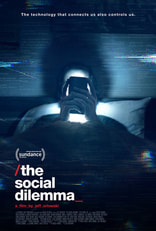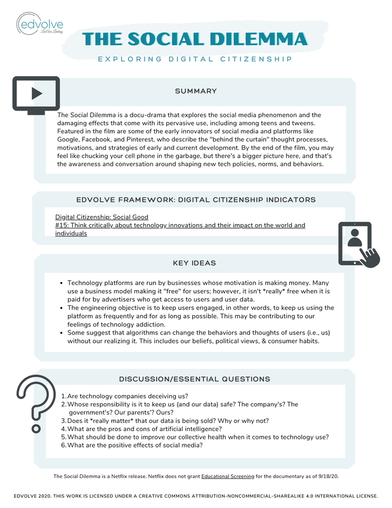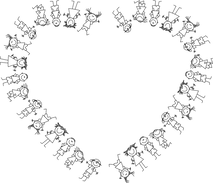|
What is The Social Dilemma? The Social Dilemma is a Netflix docu-drama (documentary with an embedded fictional dramatization) about the explosion of social media throughout the past decade and the ensuing damage to us (its users) and society as a whole. It features several Silicon Valley early innovators who send warnings that might just make you want to chuck your phone right out the window. This film takes us "behind the curtain" so to speak of the tech companies who bring us platforms such as Google, Facebook, and Pinterest. Commentary from the innovators, engineers, and masterminds behind the platforms heightens the believability that: 1) social media is mind-f'ing us, 2) we are all addicts (or well on our way), and 3) society is doomed. I won't spoil it for you by giving away the reasons for #1-3 above because there's too many nuggets to adequately share in a blog post. I encourage you watch it and see for yourself. It will likely open your eyes (or serve as an important reminder) that tech companies' motivation is not altruistic; it's financial -- and that they are designing this stuff to keep us coming back for more no matter the consequences. Reactions The reaction that I've seen from my personal social media connections about the film has been fear, anger, and the urge to purge all technology. It seems to be having an impact. But not everyone thinks the noise this film is creating is spot on. Casey Newton of the Verge wrote What 'The Social Dilemma' misunderstands about social networks which suggests that the film is shortsighted in pointing the finger with such one-directional clarity at the tech companies for society's ills. Not because he thinks the big social network companies hold no responsibility, but rather that they're not solely responsible and that overemphasizing their role oversimplifies a complex issue. He's not wrong. My Take Most of us spend more time than we'd like to admit mindlessly scrolling our social media feeds and watching entertaining but not highly purposeful videos on YouTube. We instinctively understand that this is not healthy, and that tech companies are having their way with us, but most of us don't really understand exactly how we're being played... or why.. or in what way, like, specifically. And frankly, I think most of us are okay not knowing. We don't want to know how the sausage is made. Just serve us up more dog videos, please. The problem with not knowing is that we are engaging with digital content in ways that actually shape who we are and what we think -- without us realizing it. It's only when we decide we want to know more, including how the technology works, what drives its design, and how its functionality can manipulate our behaviors and thoughts, that we can equip ourselves to make more intentional decisions to reduce its power. For me, watching this film is about just that -- understanding more so that I can be more intentional about my technology use. It's about recognizing what happens with MY data and YOUR data while I'm perusing my feed and clicking on intriguing links; it's about being mindful that my perception of what's real is influenced by the content that social media algorithms serve me. It's about lifting the veil on how the sausage is made -- the good, the bad, and the unexpected. It's easy to watch this film and get sucked in to a fear mentality about technology and the path we seem to be heading down. It's also easy to feel overwhelmed with the problems that are presented in the film, and lack of solutions. Personally, I don't (and won't) buy in to the "society is doomed" narrative. There's a lot of good that has, and will continue to be done in the world with the help of social media and technology. I do, however, believe that it's up to us to be in the know so we can own our role in shaping the digital landscape and help create policies that work in our favor rather than the tech companies'. I prefer to think of the film, NOT as a doomsday warning about technology, but rather an important lesson about our ever increasing digital connectedness. A lesson that prepares me to lead and participate in more conversations that can help us shape a better digital future. Digital Citizenship When we help our students see their role as citizens of the digital world, we help them to take ownership of the community we are all constantly creating. My friend and fellow digital citizenship enthusiast, Kristen Mattson describes digital citizenship as the intersection of technology and humanity. The Social Dilemma sits squarely at that crossing. Quality digital citizenship education asks students to explore real-life questions about technology ethics. Educators who work with students of appropriate age (this film is rated PG-13) can leverage the content in this film to spark students' curiosity about the impact of technology on individuals and society (which happens to be indicator #15 for digital citizenship on Edvolve's framework). For example, students can investigate, research, and defend a position on a question such as: Whose responsibility is it to keep us (and our data) safe? The company's? The government's? Our parents'? Ours? I've create a one-page "film brief" to help teachers and parents use The Social Dilemma as a starting point for meaningful conversations with students that includes a summary of the film, key ideas, and 6 questions that don't have easy (or "right") answers. My hope is that this film can encourage both adults and young adults to become curious and willing to learn how the sausage is made -- to become empowered to take greater control of technology, instead of allowing it to control us. Please use and share this resource with colleagues who work with age-appropriate students. Cheers, LeeAnn P.S. Netflix does not grant Educational Screening for the documentary, at least at the time this post was written. In short, this means that viewing the film "in-class" through a teacher's personal Netflix account is not allowed.
0 Comments
Leave a Reply. |
AuthorI care deeply about helping educators cultivate healthy environments where every student and teacher can learn, grow, and thrive in this digital world! |




 RSS Feed
RSS Feed
